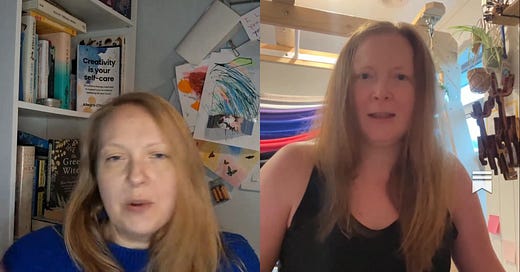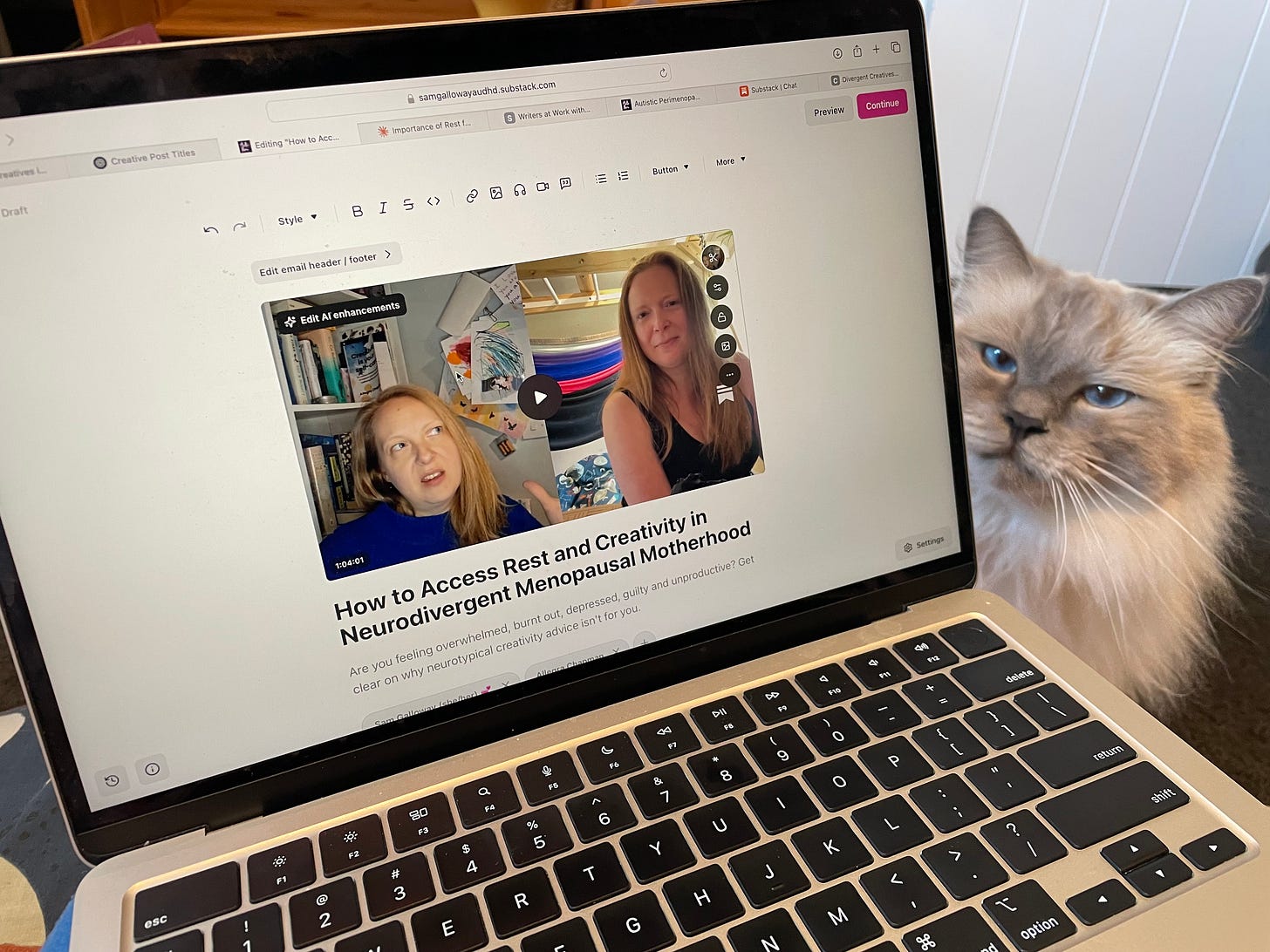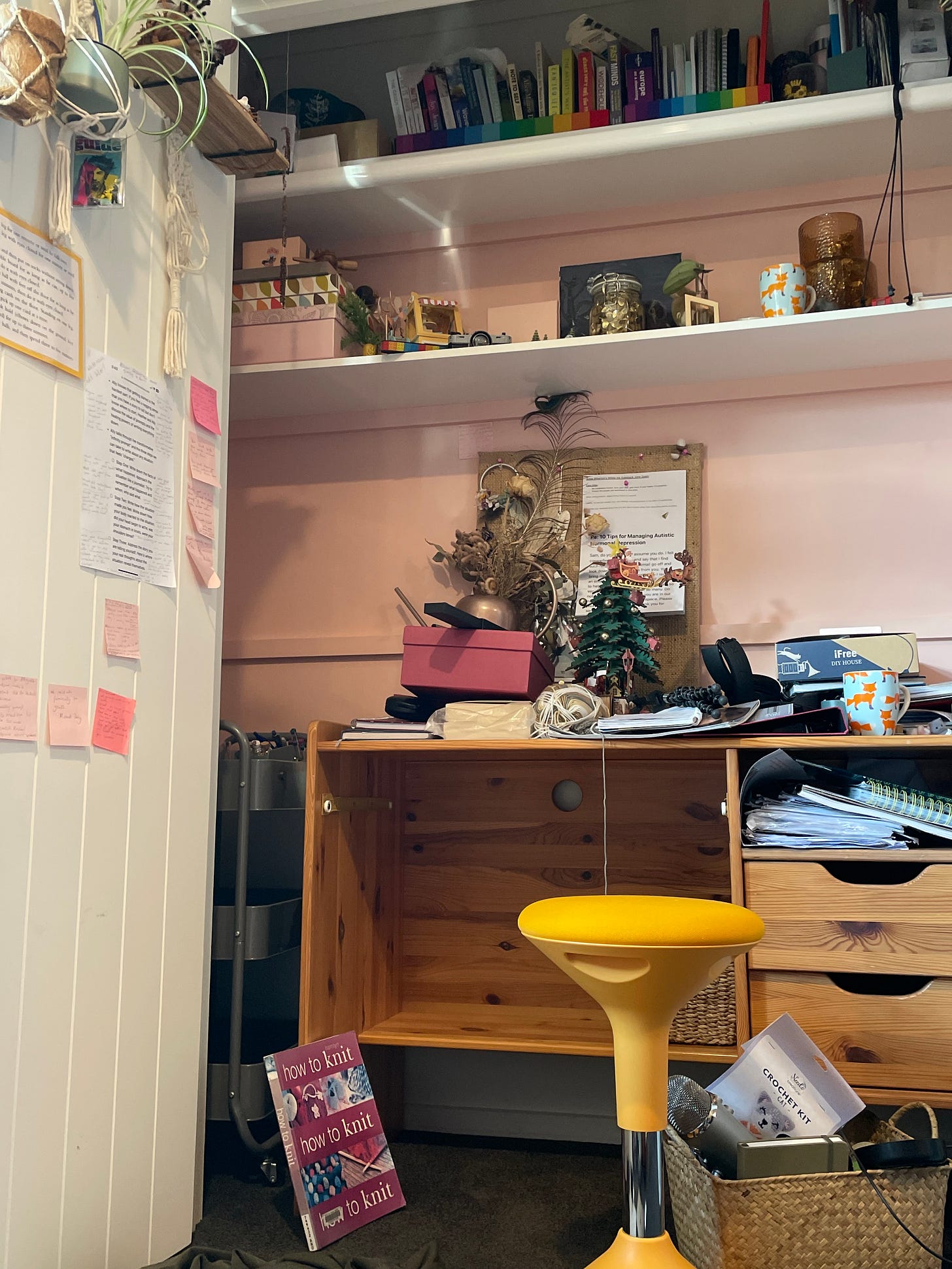Thank you to
, and many others for joining my live video with !Bonus! Scroll to the end of post for a gratuitous cute cat photo... 🐈 ⬇️
Let's talk about creativity, rest, and why you are doing better than you think — even on the hard days.
TL;DR: Rest, Creativity, and Self-Compassion
Creativity looks different for everyone, especially if you're neurodivergent, disabled, menopausal or raising kids.
You don't need to create every day. Rest is part of the creative process.
Depression, ADHD, and PDA (Pathological Demand Avoidance/Pervasive Drive for Autonomy) can make creativity feel impossible — and that's okay.
Tiny goals (like opening a document) and body doubling (working alongside someone virtually) can help.
There are seven types of rest (physical, mental, emotional, social, sensory, creative, spiritual) — and we all need different kinds at different times.
Crafting, knitting, Lego building, journaling — all of these are real creativity and real rest.
Self-care is not selfish. You are worthy of it, even when you're not producing anything.
Build a creative practice that fits your energy, your mind, and your real life — not following somebody else's rules.
💕 Start where you are. Go gently. You are doing enough.
So much generous advice from Allegra about the balancing act of creating and resting, whilst managing motherhood and midlife adulting in general.
You can subscribe to Allegra’s Substack at The Gathering.
If you would like to work with Allegra she is running her Divergent Creatives course in June 2025 and is offering a time limited discount here.
💕
Notes on accessibility:
Apologies again for my numerous audio and visual tech issues, I hope the video is accessible to you.
Closed captions are available in video playback.
There is a verbatim transcript within this post.
Audio alone may be triggering to those with auditory processing sensitivities from the second half onwards, hence why I had to stick my fingers in my ears whilst talking towards the end of the conversation. I sounded like I was in a cave! I don’t like caves…
Note to my husband AKA Life Admin Time:
, I need a new phone! 😭 ☎️Notes on AI as an accessibility tool in this post:
Our discussion was full of self-compassion to inspire you and support our creative endeavours with as little energy and capacity that may be available to us at any given time.
To this end, I have asked ChatGPT to summarise the video transcripts for you, because it is beyond my limited capacity.
I use AI as an accessibility tool in some of my posts to ensure I can provide information as succinctly as possible, and I always disclose this to you.
I have checked that the summaries (TL;DR above, and timestamped summary below, both in block text) provided make sense and reflect the vibe of our discussion.
Even using AI to summarise I have spent two hours hyperfocused on drafting this post, argh!
Clear and succinct communication is not a personal strength of mine, so here AI is providing the job of a virtual assistant:
The longer summary…
Timestamped Summary of "Rest and Creativity" Conversation
00:00 – 00:16 | Introduction
The conversation opens about the need to talk about rest and creativity.
Sam shares personal struggles with depression and physical exhaustion in neurodivergent perimenopause.
00:16 – 01:00 | Self-Care When You’re Exhausted
Basic self-care (eating, meds, water) was all Sam could manage during a recent depressive episode.
Hormonal issues made it harder; could barely leave the house for two weeks.
Creativity felt impossible when functioning at the bare minimum.
01:00 – 02:10 | The Difficulty of Creativity in Depression
They discuss how masking struggles — like pretending to function while struggling inside — drains energy.
Parenting makes it even harder because there's no real option to retreat fully for self-care.
02:10 – 04:00 | Redefining Creativity for Neurodivergent and Disabled People
Introduction to Allegra’s Substack mission: supporting creatives who are neurodivergent, disabled, chronically ill, or raising kids.
Breaking myths: You don’t need to create every day to be a “real creative.”
Allegra advises banning the word "should." Creative practices must fit individual needs.
04:00 – 06:00 | Fighting the Myth of Daily Consistency
Allegra’s personal experience: writing two books without daily word counts.
Encouragement to ignore rigid advice and find what works for you.
06:00 – 08:00 | Coping with Depression in Creative Life
Depression often blocks access to all the helpful activities (nature, creativity, movement).
When depressed, just surviving is enough.
Recommend creating a "self-care toolkit" in advance (like coloring books, prompts, knitting).
08:00 – 10:00 | Creative Rest and Chronic Conditions
Case study: a participant in a creative program who could only manage 15 minutes a day.
Even tiny creative actions are valuable.
Rest can be creative.
10:00 – 14:00 | PDA, ADHD, and Demand Avoidance
Discussion of PDA (Pathological Demand Avoidance) and its neuro-affirming term Pervasive Drive for Autonomy.
How PDA complicates creative work, even when it's something you want to do.
Challenges with ADHD, PDA, and creative resistance.
14:00 – 18:00 | Crafting, Knitting, and Self-Compassion
Knitting discussed as a low-pressure creative outlet.
Tips: start simple (e.g., knit a scarf, not socks!).
Crafting seen as valid creativity and a form of therapeutic rest.
18:00 – 22:00 | The Seven Types of Rest
Based on Dr. Saundra Dalton-Smith’s work (TEDx talk), explained through a book by Tamu Thomas:
Physical Rest
Mental Rest
Emotional Rest
Social Rest
Sensory Rest
Creative Rest
Spiritual Rest
Understanding these helps tailor rest for neurodivergent and busy lives.
22:00 – 26:00 | Rest as Resistance
Rest is crucial for caregivers and neurodivergent people.
Respite can be as simple as headphones in the same room.
Recognising the emotional toll of caregiving and demanding lives.
26:00 – 31:00 | Accountability, Body Doubling, and Tiny Goals
Accountability is a major motivator for creative people.
Body doubling (working alongside someone else) helps maintain focus.
Set very tiny goals ("open the Word document" — that's enough!) to overcome inertia.
31:00 – 36:00 | Different Tools for Different Brains
Visual cues like leaving projects lying around and visible help ADHD minds.
Flexible habits ("rituals," not rigid routines) work better for many neurodivergent creatives.
Understand yourself first — then build systems around your real needs.
36:00 – 42:00 | Nonlinear Creative Processes
Bullet points, mind maps, recording yourself — all valid first steps.
Finished creative work never starts polished — allow messy beginnings.
42:00 – End | Closing Thoughts
Let go of the idea there’s only one "right" creative method.
Adapt creativity around fluctuating mental health and energy.
Self-care is a right, not just a means to be more productive for others.
Discussion ends with warmth and encouragement to honor your own rhythm.
If you have read this far, thank you. Here is a photo of Harry as tax, overseeing the post-editing process.
Here is social proof that I am indeed putting the ADHD into “But you don’t look neurodivergent!” (By the way, nobody has ever told me I don’t look autistic or ADHD, ha ha!):
Wish me luck, I am relocating my dumping ground DOOM pile writing desk to another room in the house later today! 🤞
Fun fact! Did you know the “DOOM” in “DOOM pile” stands for “didn’t organise, only moved”?
Look at that basket on the floor, it has my proper mic in it. Regrets, I have a few…
Two coffee mugs to be found in the photo! 🦊 🦊
If you would like to buy me a coffee, I would be very grateful!
Until next time!



















Share this post